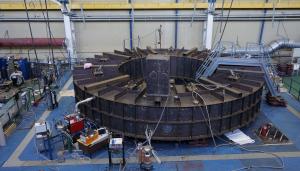Smallest poloidal field coil ready for shipment
The smallest of ITER's six ring-shaped poloidal field coils has passed all factory acceptance tests in Russia. The next step is shipment to the ITER site.
At the Sredne-Nevsky Shipyard in Saint Petersburg, specialists have completed the factory acceptance tests on poloidal field coil #1 (PF1). Successful testing, confirmed by specialists of the ITER Organization, allows Russian enterprises to begin preparing for the shipment of the magnet coil to ITER in the south of France.
Nine metres in diameter and weighing 160 tonnes, PF1 is one of six coils in the ITER poloidal field magnetic system, which serves to confine fusion fuel in the form of a plasma in the ITER reactor. At the core of each poloidal field magnet are coiled layers of niobium-titanium (NbTi) superconductor—for PF1, approximately 6 km of conductor was required.
The fabrication of an ITER poloidal field coil requires several stages of verification due to its first-of-a-kind nature and the extremely high requirements imposed by the ITER Organization. High-voltage DC tests with a voltage of 30 kV, high-voltage AC tests with a voltage of 10 kV, a Paschen test with a voltage of 15 kV in a vacuum chamber with a pressure range of 1-100 000 Pa, and leak tests in a vacuum vessel are all part of the factory acceptance testing package. The results of all tests performed earlier this year confirmed full compliance with the requirements of the ITER Organization.
This is one of the 25 systems included in the scope of responsibility of the Russian Federation in the framework of the ITER project. The shipment of the PF1 coil to ITER is planned for the middle of this year.


